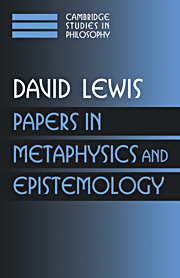Book contents
- Frontmatter
- Contents
- Introduction
- 1 New work for a theory of universals
- 2 Putnam's paradox
- 3 Against structural universals
- 4 A Comment on Armstrong and Forrest
- 5 Extrinsic properties
- 6 Defining ‘intrinsic’ (with Rae Langton)
- 7 Finkish dispositions
- 8 Noneism or allism?
- 9 Many, but almost one
- 10 Casati and Varzi on holes (with Stephanie Lewis)
- 11 Rearrangement of particles: Reply to Lowe
- 12 Armstrong on combinatorial possibility
- 13 A world of truthmakers?
- 14 Maudlin and modal mystery
- 15 Humean Supervenience debugged
- 16 Psychophysical and theoretical identifications
- 17 What experience teaches
- 18 Reduction of mind
- 19 Should a materialist believe in qualia?
- 20 Naming the colours
- 21 Percepts and color mosaics in visual experience
- 22 Individuation by acquaintance and by stipulation
- 23 Why conditionalize?
- 24 What puzzling Pierre does not believe
- 25 Elusive knowledge
- Index
Introduction
Published online by Cambridge University Press: 08 February 2010
- Frontmatter
- Contents
- Introduction
- 1 New work for a theory of universals
- 2 Putnam's paradox
- 3 Against structural universals
- 4 A Comment on Armstrong and Forrest
- 5 Extrinsic properties
- 6 Defining ‘intrinsic’ (with Rae Langton)
- 7 Finkish dispositions
- 8 Noneism or allism?
- 9 Many, but almost one
- 10 Casati and Varzi on holes (with Stephanie Lewis)
- 11 Rearrangement of particles: Reply to Lowe
- 12 Armstrong on combinatorial possibility
- 13 A world of truthmakers?
- 14 Maudlin and modal mystery
- 15 Humean Supervenience debugged
- 16 Psychophysical and theoretical identifications
- 17 What experience teaches
- 18 Reduction of mind
- 19 Should a materialist believe in qualia?
- 20 Naming the colours
- 21 Percepts and color mosaics in visual experience
- 22 Individuation by acquaintance and by stipulation
- 23 Why conditionalize?
- 24 What puzzling Pierre does not believe
- 25 Elusive knowledge
- Index
Summary
This collection reprints almost all my previously published papers in metaphysics and epistemology, except for those that were previously reprinted in another collection. There is also one previously unpublished paper. Still omitted are three book reviews and four rejoinders. I have taken the opportunity to correct typographical errors and editorial alterations. But I have left the philosophical content as it originally was, rather than trying to rewrite the papers as I would write them today.
The first six papers have to do with properties. ‘New Work for a Theory of Universals’ marked a big turning point in my philosophical position. Formerly I had been persuaded by Goodman and others that all properties were equal: it was hopeless to try to distinguish ‘natural’ properties from gruesomely gerrymandered, disjunctive properties. Eventually I was persuaded, largely by D. M. Armstrong, that the distinction I had rejected was so commonsensical and so serviceable - indeed, was so often indispensable - that it was foolish to try to get on without it. We should accept it as primitive if need be; or we should admit that we understand whatever else it may take to explain it. What else? – Here we have several choices: among them, a suitable version of a primitive similarity relation; or perhaps a sparse theory of universals, as advocated by Armstrong.
‘Putnam's Paradox’ expands the part of ‘New Work’ devoted to arguing that the distinction between natural and gerrymandered properties - if indeed we're prepared to grant that we can understand such a distinction - serves to answer Putnam's famous ‘model-theoretic argument’ for extreme semantic indeterminacy, and thence for the automatic truth of ideal theories.
Information
- Type
- Chapter
- Information
- Papers in Metaphysics and Epistemology , pp. 1 - 7Publisher: Cambridge University PressPrint publication year: 1999
